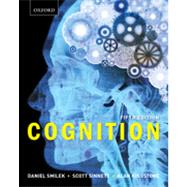This engaging guide to the hidden corridors of the mind explores the mental processes through which we interact with the world. Drawing on the work of esteemed researchers and scholars, Cognition applies real-life examples to key theories in order to create an accessible, yet comprehensive primer to the field.
~~~~~~~~~~~~~~~~~~~~~~~~~~~~
DISTINCTIVE FEATURES
Demonstrates how theory can be applied to real-life situations, providing a practical approach for first-time students of cognitive psychology
Covers key topics such as perception, memory, language, problem-solving, creativity, and reasoning, giving students a well-rounded introduction to the field
Cites classic and current research from around the world, including the U.S., Canada, and Europe, offering students a global perspective on the study of cognition
Presents key historical information at the start of each chapter, providing a context for the material that follows
Includes rich pedagogy, encouraging active learning of key concepts:
* "Cognition in Action" boxes connect real-life examples with chapter material.
* "Think Twice" boxes feature creative review exercises that invite students to engage personally with ideas and issues raised in the chapter.
* "Consider This" boxes highlight notable and cutting-edge research findings.
* "In the Know" review questions at the end of each chapter provide further opportunity for students to test their comprehension.
* The book also includes a running glossary, highlighted key terms, learning objectives, chapter summaries, and suggestions for further reading.
~~~~~~~~~~~~~~~~~~~~~~~~~~~~
INSTRUCTOR RESOURCES
Instructor's Manual
* Chapter overviews
* Key concepts with illustrative examples
* Discussion and debate ideas
* Further reading, media suggestions, and teaching aids
* Homework assignments with sample answers
* Suggestions for research paper topics
* Sample syllabus
* Web links
PowerPoint Slides
* Summary of key points for each chapter
* Figures, tables, and images from the book
Test Bank with questions for every chapter, including:
* 25+ multiple-choice questions
* 25 short-answer questions
* 25+ true-or-false questions
* 15 fill-in-the-blank questions
~~~~~~~~~~~~~~~~~~~~~~~~~~~~
STUDENT RESOURCES
Interactive Quizzes
* Sample final exam
* Review questions with answers
* For every chapter: 3-4 short-answer questions, 5 fill-in-the-blank questions, 5 true-or-false questions, and 10 multiple-choice questions
Student Study Guide
* Chapter summaries
* Key terms with definitions
* Midterm and final exam study tips
Discovery Lab Online (ISBN 9780195447774)
* Includes 30-40 labs that test or demonstrate key concepts or theories covered in the text
* Gives students an opportunity to act as researcher or test subject, and the ability to analyze and share results
E-Book (ISBN 9780199000579)
Available through CourseSmart








